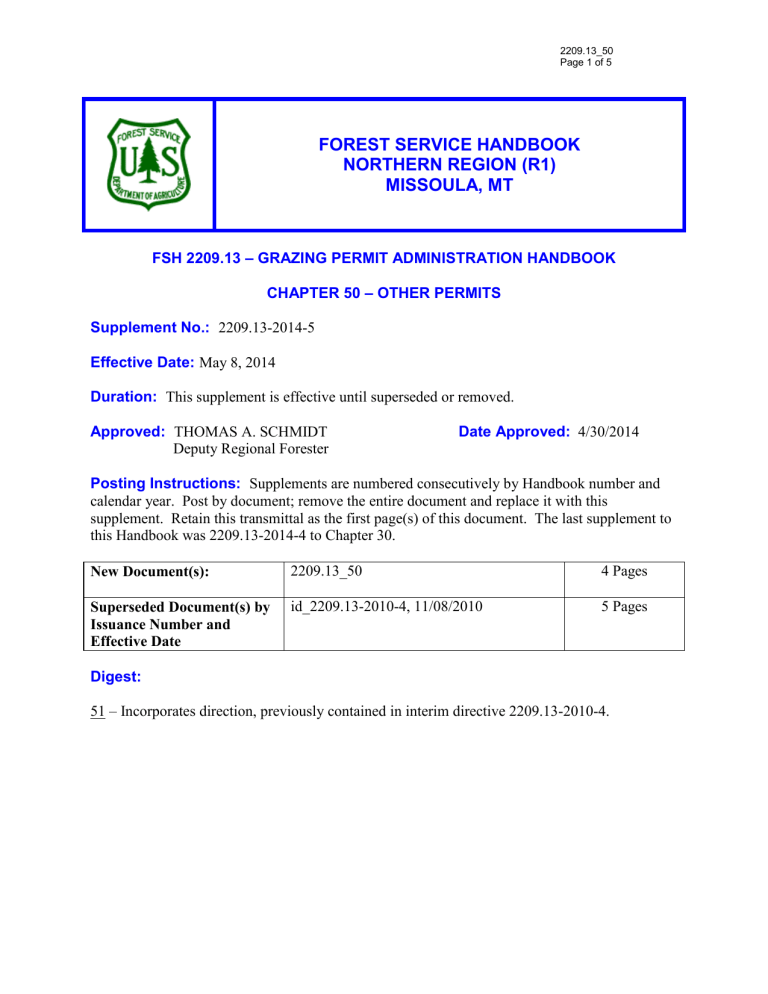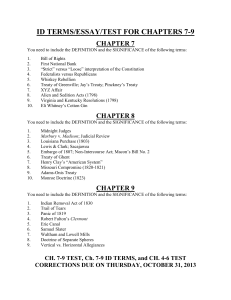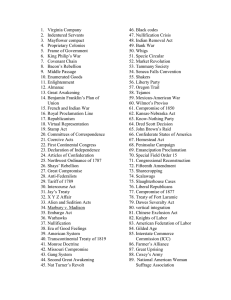FOREST SERVICE HANDBOOK NORTHERN REGION (R1) MISSOULA, MT

2209.13_50
Page 1 of 5
FOREST SERVICE HANDBOOK
NORTHERN REGION (R1)
MISSOULA, MT
FSH 2209.13 – GRAZING PERMIT ADMINISTRATION HANDBOOK
CHAPTER 50
– OTHER PERMITS
Supplement No.: 2209.13-2014-5
Effective Date: May 8, 2014
Duration: This supplement is effective until superseded or removed.
Approved: THOMAS A. SCHMIDT
Deputy Regional Forester
Date Approved: 4/30/2014
Posting Instructions: Supplements are numbered consecutively by Handbook number and calendar year. Post by document; remove the entire document and replace it with this supplement. Retain this transmittal as the first page(s) of this document. The last supplement to this Handbook was 2209.13-2014-4 to Chapter 30.
New Document(s): 2209.13_50 4 Pages
Superseded Document(s) by
Issuance Number and
Effective Date id_2209.13-2010-4, 11/08/2010 5 Pages
Digest:
51 – Incorporates direction, previously contained in interim directive 2209.13-2010-4.
R1 SUPPLEMENT 2209.13-2014-4
EFFECTIVE DATE: 5/08/2014
DURATION: This supplement is effective until superseded or removed.
2209.13_50
Page 2 of 5
FSH 2209.13 – GRAZING PERMIT ADMINISTRATION HANDBOOK
CHAPTER 50 – OTHER PERMITS
Table of Contents
51.17 – Grazing by Tribes and Native Americans on National Forest System Lands Not
R1 SUPPLEMENT 2209.13-2014-4
EFFECTIVE DATE: 5/08/2014
DURATION: This supplement is effective until superseded or removed.
2209.13_50
Page 3 of 5
FSH 2209.13 – GRAZING PERMIT ADMINISTRATION HANDBOOK
CHAPTER 50 – OTHER PERMITS
51 - OTHER GRAZING AUTHORIZATIONS
51.1 - Grazing Permits Issued to Indian Tribes in Recognition of Treaty Rights
Some National Forest System lands originally came into federal ownership as a result of treaties negotiated with Indian tribes which ceded certain land to the United States in return for the designation of other land as a permanent reservation for the tribes. In some treaties, Indian tribes reserved certain rights in the ceded land. One type of “off-reservation right” identified in some treaties involves the grazing or pasturing of livestock. Sometimes these treaty rights were reserved exclusively to the tribe; in other situations the rights were reserved to the tribe “in common with” other non-Indian users. Some treaties refer specifically to grazing on the ceded land; in other cases, treaties refer specifically to grazing on “unclaimed land.” Ambiguities in treaty language are typically resolved by courts in favor of the Tribes.
Where an Indian tribe’s claim of treaty rights involve grazing on National Forest System land, it is imperative for the authorized officer to carefully review the specific language of the treaty.
Where the treaty reserves grazing on “unclaimed lands” it is necessary to identify the location of these lands and determine whether the Indian tribe or its members were grazing livestock in this area at the time of the treaty.
It is desirable to enter into a memorandum of understanding with an Indian tribe where offreservation treaty rights involving grazing on National Forest System lands are involved so that all the parties mutually understand and agree to their respective rights and responsibilities. Non-
Indian permittees who may be affected by such a memorandum of understanding should be notified of this endeavor and be allowed to participate where appropriate.
51.11 – Nature of Treaty Rights
Where expressly reserved by treaty, tribal grazing shall be recognized as a reserved right on
National Forest System land held in perpetuity by the Indian tribe.
51.12 – Scope of Treaty Rights
The scope of a reserved treaty right is defined by the specific language in the treaty. In some instances the treaty may restrict grazing to the lands ceded to the United States; in other instances, the treaty may have reserved grazing to “unclaimed land.”
51.13 – Treaty Right Beneficiaries
The only party that can claim the reserved right to graze on NFS land under a treaty with the
United States is the tribe with whom that treaty was originally negotiated. Once the scope of the treaty rights is determined, the tribe will determine how to allocate the grazing among its
R1 SUPPLEMENT 2209.13-2014-4
EFFECTIVE DATE: 5/08/2014
DURATION: This supplement is effective until superseded or removed.
2209.13_50
Page 4 of 5
FSH 2209.13 – GRAZING PERMIT ADMINISTRATION HANDBOOK
CHAPTER 50 – OTHER PERMITS enrolled members. Under no circumstances may the tribe allocate grazing reserved under a treaty to non-members.
51.14
– Extent of Treaty Right on National Forest System Land
While an Indian tribe may be the beneficiary of treaty rights to graze on some National Forest
System lands by virtue of a treaty with the United States, it is the responsibility of the authorized officer to determine how the grazing will be exercised. If an Indian tribe is unable or unwilling to exercise the full extent of its treaty right through the issuance of permits to tribal members, the authorized officer may issue a term grazing permit to another that is a non-Indian user who satisfies the requisite eligibility and qualification requirements set forth in chapter 10.
51.15 – Grazing Reductions on National Forest System Land
In the event that the authorized officer determines that a reduction in grazing on National Forest
System lands where treaty rights are involved is warranted, the allocation of reductions may be handled differently depending on whether the rights in the treaty were reserved exclusively by the Indian tribe or “in common with” other, non-Indian, users.
Where the treaty rights are the subject of an exclusive reservation in the treaty, the authorized officer shall first reduce permits issued outside of the treaty. Reductions to permits issued pursuant to the reserved treaty rights will only be taken when reductions to all other grazing permits are inadequate to accomplish legal or resource management objectives.
Where, however, the treaty rights were reserved by the Indian tribe in common with other, non-
Indian users, the authorized officer shall allocate reductions to accomplish the legal or resource management objective proportionately among all the permit holders regardless of whether the permit was issued in recognition of a treaty right.
51.16
– No Fees Charged for Tribal Exercise of Reserved Treaty Rights
The authorized officer shall not charge a fee for an Indian tribe exercising its treaty right to graze on National Forest System lands.
51.17 – Grazing by Tribes and Native Americans on National Forest System Lands
Not Subject to Reserved Treaty Rights
Where National Forest System lands are not subject to reserved treaty rights, the authorized officer shall administer permits issued to Indians in accordance with the same policies and procedures that apply to permits issued to non-Indians.
R1 SUPPLEMENT 2209.13-2014-4
EFFECTIVE DATE: 5/08/2014
DURATION: This supplement is effective until superseded or removed.
2209.13_50
Page 5 of 5
FSH 2209.13 – GRAZING PERMIT ADMINISTRATION HANDBOOK
CHAPTER 50 – OTHER PERMITS
51.18 – Internal Review and Coordination
Since the issue of Indian tribal rights on National Forest System land is a highly specialized field and since most of the Indian treaties are more than 100 years old, authorized officers should consult with their regional rangeland management specialist and the Office of the General
Counsel before making any decisions regarding the scope and extent of treaty rights an Indian tribe may rightfully claim under a treaty with the United States.
51.2 – Incidental Grazing Authorized by Special Use Permit
In limited circumstances, special use permits may authorize the use of forage as incidental to the primary use or activity authorized by the permit. For example, a special use permit issued for an outfitter and guide operation may include a provision for the use of forage by the pack and saddle stock utilized by the permit holder as part of his or her operation.





